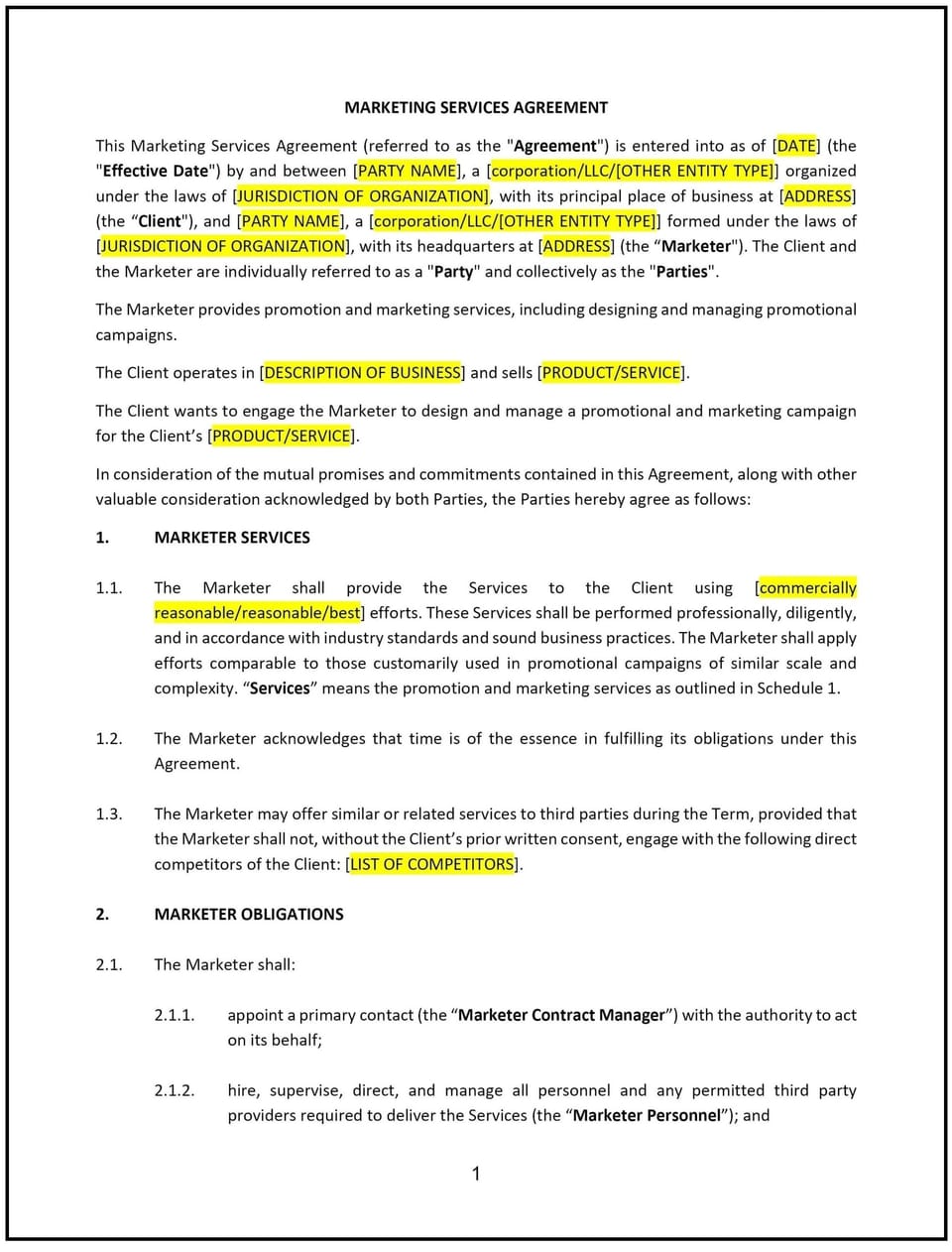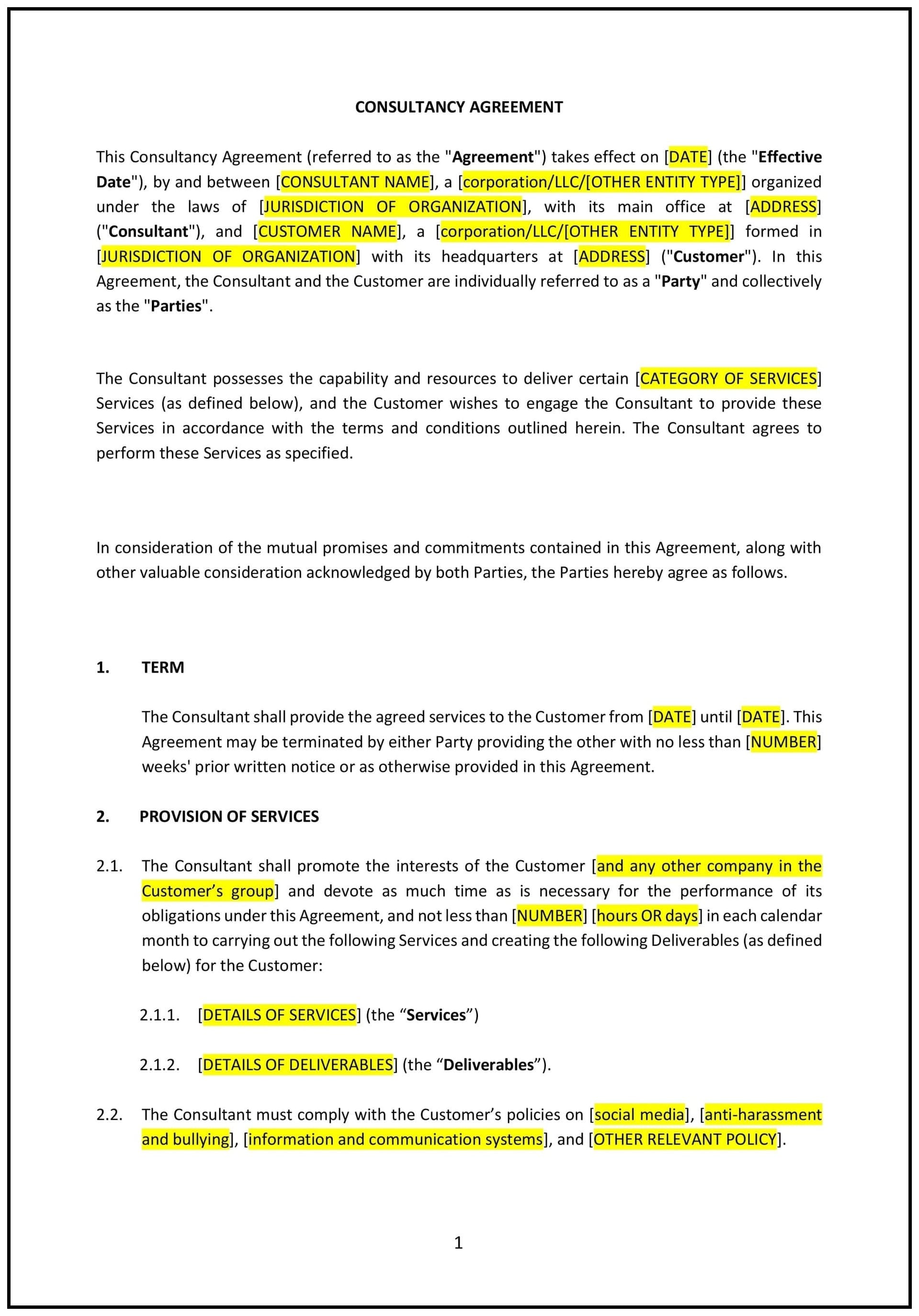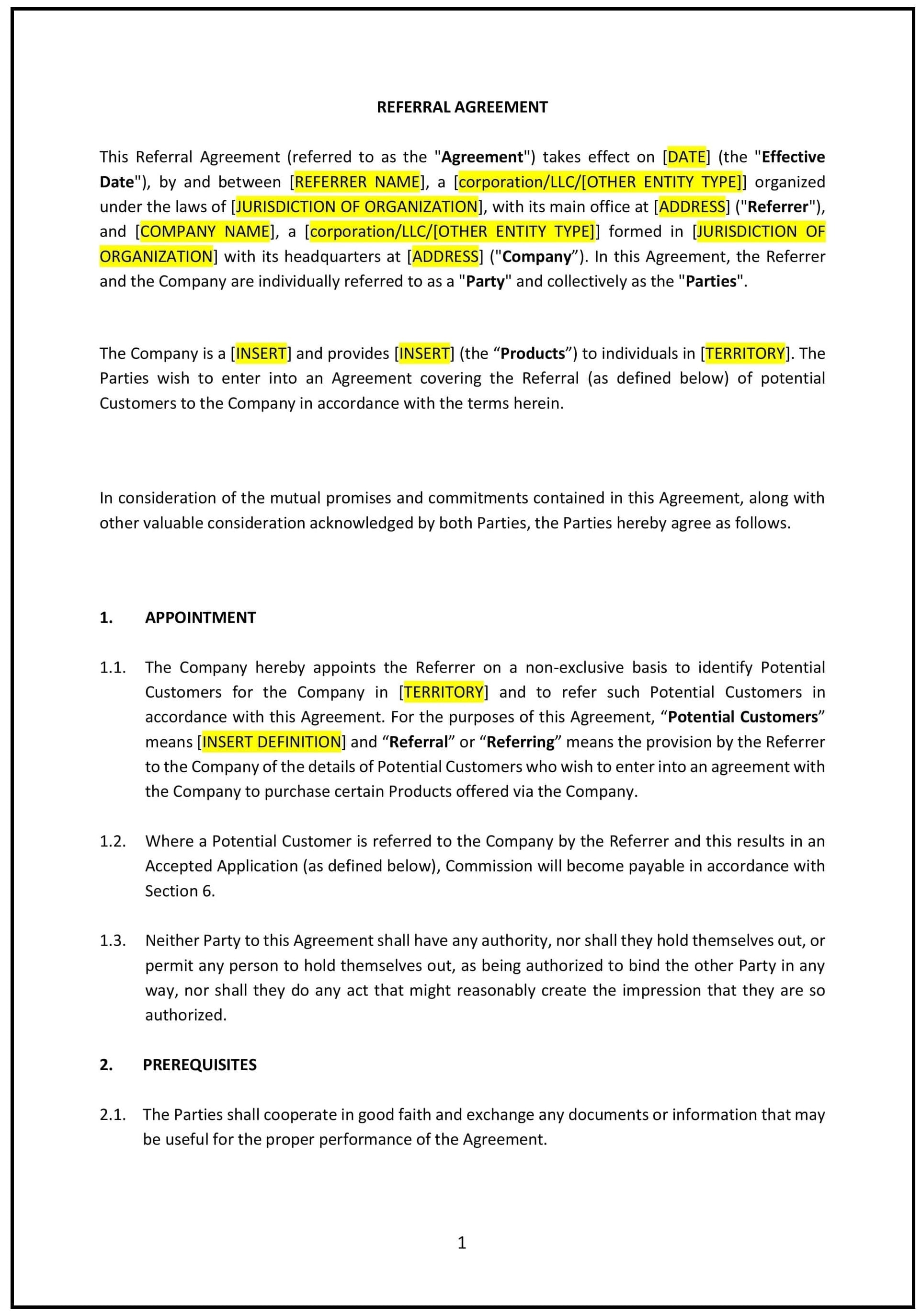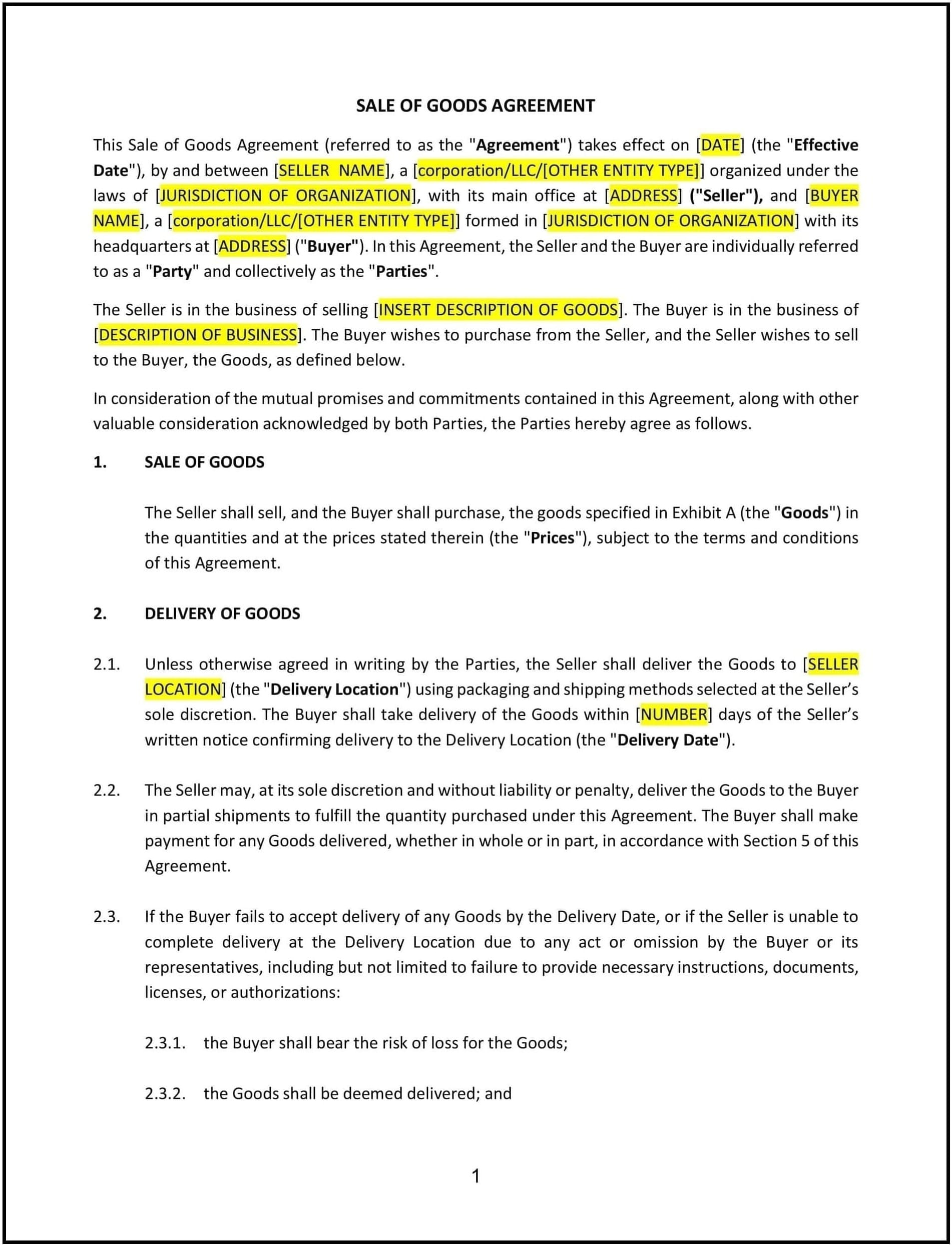Marketing Services Agreement (Alaska): Free template

Marketing Services Agreement (Alaska)
A Marketing Services Agreement is a legally binding contract between a client and a marketing service provider that outlines the terms and conditions under which marketing services will be provided. In Alaska, these agreements are commonly used in industries such as retail, real estate, healthcare, and technology to ensure clarity on campaign goals, deliverables, timelines, payment terms, and performance metrics.
For instance, an Anchorage-based marketing agency might use a Marketing Services Agreement to formalize its collaboration with a Fairbanks-based tourism company to launch a digital advertising campaign promoting Alaska’s natural attractions. A well-drafted agreement fosters transparency, minimizes disputes, and aligns with Alaska’s legal framework.
Tips for drafting and maintaining a Marketing Services Agreement in Alaska
- Define the scope of services: Clearly outline the marketing services to be provided, including campaign goals, deliverables, and timelines. Specify whether the services include content creation, social media management, SEO, PPC, or other activities.
- Example: “Party A agrees to provide digital marketing services for Party B, including social media management, email campaigns, and search engine optimization. The campaign will run for six months, starting on January 1, 2024.”
- Specify performance metrics and KPIs: Define measurable goals and key performance indicators (KPIs) to evaluate the success of the marketing efforts. Include benchmarks for metrics such as website traffic, conversion rates, and engagement levels.
- Example: “The campaign’s success will be measured by achieving a 25% increase in website traffic and a 15% increase in online bookings within six months.”
- Outline payment terms: Detail how the marketing service provider will be compensated, including fixed fees, performance-based bonuses, or retainer models. Include payment schedules, invoicing procedures, late payment penalties, and any additional costs.
- Example: “Party B agrees to pay Party A a monthly retainer fee of $6,000, plus a performance-based bonus of 5% of net revenue generated from the campaign.”
- Address reporting and auditing requirements: Specify the frequency and format of performance reports, as well as the right of the client to audit the service provider’s records to verify accuracy.
- Example: “Party A will provide Party B with a monthly performance report detailing campaign metrics, expenditures, and results. Party B reserves the right to conduct an annual audit of Party A’s financial records related to the campaign.”
- Clarify intellectual property rights: Define ownership of any intellectual property created during the campaign. Specify whether intellectual property rights are shared, retained by one party, or licensed.
- Example: “All creative content developed for the campaign remains the exclusive property of Party B. Party A is granted a non-exclusive, non-transferable license to use the content for portfolio purposes.”
- Protect confidentiality and data security: Safeguard sensitive information shared during the campaign by including confidentiality clauses that align with Alaska’s trade secret and privacy laws. Address data security measures to protect customer data and campaign strategies.
- Example: “Both parties agree to maintain the confidentiality of all proprietary information disclosed during the term of this agreement and for a period of five years thereafter. Each party will implement industry-standard encryption and access controls to protect shared data.”
- Set termination provisions: Define the circumstances under which the agreement can be terminated, such as breach of terms, mutual consent, or expiration of the agreement. Include steps for transitioning responsibilities if the agreement ends.
- Example: “Either party may terminate this agreement with 30 days’ written notice if the other party fails to comply with the terms outlined herein. Upon termination, Party A will deliver all completed work to Party B.”
- Include dispute resolution mechanisms: Specify how disputes will be resolved, whether through negotiation, mediation, arbitration, or litigation. Include jurisdiction and governing law clauses to streamline the process.
- Example: “Any disputes arising under this agreement shall be resolved through binding arbitration in accordance with the rules of the American Arbitration Association. The arbitration will take place in Anchorage, Alaska, and the decision will be final and binding.”
- Align with Alaska-specific laws: Ensure the agreement adheres to Alaska’s contract laws, including the Alaska Uniform Commercial Code (UCC) for transactions involving goods. Additionally, address alignment with consumer protection statutes and data privacy regulations.
- Example: “This agreement shall be governed by and construed in accordance with the laws of the State of Alaska. Both parties agree to adhere to all applicable state and federal laws, including consumer protection and data privacy regulations.”
- Specify warranties and disclaimers: Include any warranties provided by the service provider, such as performance guarantees, as well as disclaimers for issues outside their control.
- Example: “Party A warrants that all marketing services will be performed in a professional manner. However, Party A disclaims any liability for external factors such as algorithm changes, platform outages, or competitor actions.”
Frequently asked questions (FAQs)
Q: Can a Marketing Services Agreement include clauses specific to Alaska’s tourism or outdoor recreation industries?
A: Yes, Marketing Services Agreements in Alaska can include industry-specific clauses, especially if the campaign relates to local events, tourism campaigns, or outdoor recreation businesses. For example, a Juneau-based agency might create a campaign to promote Alaska’s national parks or fishing tours.
Q: What happens if the marketing service provider fails to meet performance metrics?
A: If the service provider fails to meet performance metrics, the agreement should specify remedies such as renegotiating terms, offering refunds, or terminating the agreement. Including clear KPIs and consequences helps prevent disputes.
Q: Are there unique tax considerations for Marketing Services Agreements in Alaska?
A: Revenue generated from Marketing Services Agreements may be subject to Alaska’s state income tax and sales tax, depending on the nature of the transaction. Consulting a tax professional ensures compliance with all applicable tax laws.
Q: How long does a Marketing Services Agreement typically last in Alaska?
A: The duration of a Marketing Services Agreement depends on the campaign’s scope and goals. It could range from a few months for short-term campaigns to several years for long-term collaborations.
Q: Can a Marketing Services Agreement include international collaboration in Alaska?
A: Yes, a Marketing Services Agreement can include international collaboration, but it should clearly specify the roles, responsibilities, and legal jurisdictions of all parties. Parties must also consider international data privacy laws when drafting such agreements.
This article contains general legal information and does not contain legal advice. Cobrief is not a law firm or a substitute for an attorney or law firm. The law is complex and changes often. For legal advice, please ask a lawyer.


